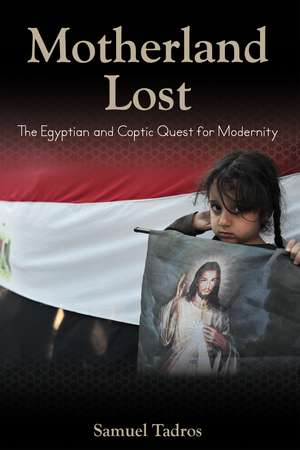Motherland Lost: The Egyptian and Coptic Quest for Modernity
Autor Samuel Tadrosen Limba Engleză Hardback – 21 iul 2013
Vezi toate premiile Carte premiată
In Motherland Lost, Samuel Tadros provides a clear understanding of the Copts—the native Egyptian Christians—and their crisis of modernity in conjunction with the overall developments in Egypt as it faced its own struggles with modernity. He argues against the dominating narratives that have up to now shaped our understanding of the Coptic predicament--their eternal persecution, from the Roman and Byzantine emperors to the rule of Islam, and the National Unity discourse--asserting rather that it is due to the crisis of modernity.
Linking the Egyptian and Coptic stories, the book argues that the plight of Copts today is inseparable from the crisis of modernity and the answers developed to address that crisis by the Egyptian state and intellectuals, as well as by the Coptic Church and laypeople. The author asserts that the answers developed by Egyptian intellectuals and state modernizers to the challenge modernity poses revolved around the problem of Islam. The Copts, then, although affected, like their fellow Egyptians, by the challenge of modernity, were faced with a separate crisis: a specific challenge to their ancient church and the need for a new orientation and revival to be able to deal with modernity and its discontents. Tadros concludes that the prospects for Copts in Egypt appear bleak and are leading to a massive Coptic exodus from Egypt.
Linking the Egyptian and Coptic stories, the book argues that the plight of Copts today is inseparable from the crisis of modernity and the answers developed to address that crisis by the Egyptian state and intellectuals, as well as by the Coptic Church and laypeople. The author asserts that the answers developed by Egyptian intellectuals and state modernizers to the challenge modernity poses revolved around the problem of Islam. The Copts, then, although affected, like their fellow Egyptians, by the challenge of modernity, were faced with a separate crisis: a specific challenge to their ancient church and the need for a new orientation and revival to be able to deal with modernity and its discontents. Tadros concludes that the prospects for Copts in Egypt appear bleak and are leading to a massive Coptic exodus from Egypt.
Preț: 145.51 lei
Preț vechi: 174.47 lei
-17% Nou
Puncte Express: 218
Preț estimativ în valută:
27.84€ • 29.15$ • 23.09£
27.84€ • 29.15$ • 23.09£
Carte indisponibilă temporar
Doresc să fiu notificat când acest titlu va fi disponibil:
Se trimite...
Preluare comenzi: 021 569.72.76
Specificații
ISBN-13: 9780817916442
ISBN-10: 081791644X
Pagini: 262
Dimensiuni: 140 x 216 x 28 mm
Greutate: 0.5 kg
Ediția:1
Editura: Hoover Institution Press
Colecția Hoover Institution Press
ISBN-10: 081791644X
Pagini: 262
Dimensiuni: 140 x 216 x 28 mm
Greutate: 0.5 kg
Ediția:1
Editura: Hoover Institution Press
Colecția Hoover Institution Press
Notă biografică
Samuel Tadros is a research fellow at the Hudson Institute's Center for Religious Freedom and a professorial lecturer at the Paul H. Nitze School of Advanced International Studies at Johns Hopkins University. Before joining Hudson in 2011, Tadros was a senior partner at the Egyptian Union of Liberal Youth, an organization that aims to spread the ideas of classical liberalism in Egypt. His current research focuses on the rise of Islamist movements in Egypt and the implications for religious freedom and regional politics. Born and raised in Egypt, he received him MA in democracy and governance from Georgetown University and his BA in political science from the American University in Cairo. He has also studied at the Coptic Theological Seminary in Cairo.
Descriere
Samuel Tadros provides a clear understanding of Copts—the native Egyptian Christians—and their crisis of modernity in conjunction with the overall developments in Egypt as it faced its own struggles with modernity. He argues that the modern plight of Copts is inseparable from the crisis of modernity and the answers developed to address that crisis by the Egyptian state and intellectuals, as well as by the Coptic Church and laypeople.
Premii
- Washington Institute Book Prize Bronze Medal Winner, 2014
